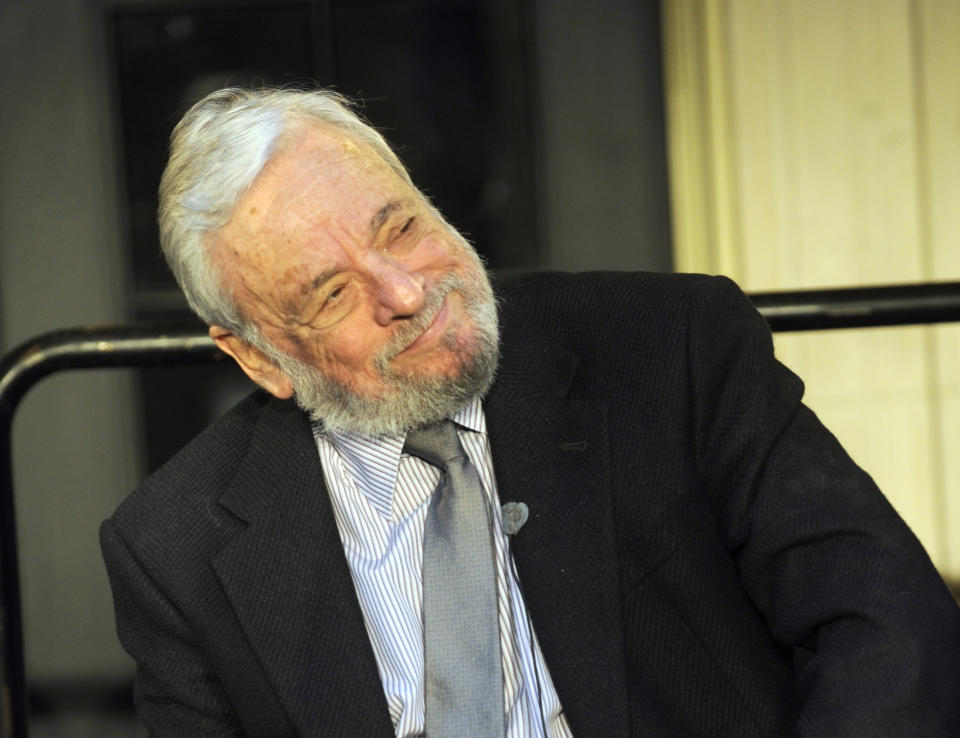Simon and Sondheim talk shop at joint appearance
NEW YORK (AP) — Stephen Sondheim and Paul Simon, two longtime New Yorkers and giants of American song, embody two very different musical traditions.
Simon, 72, and a charter member of the rock 'n' roll generation, hated the bland ballads he had to sit through on "Make Believe Ballroom," a longtime radio program that preceded the Yankees games he listened to on the porch of his childhood home in Queens. One night, the announcer introduced a record he called "the worst thing I've ever heard," Simon recalled Tuesday night during a joint stage appearance with Sondheim.
"And he plays a record called 'Gee,' by the Crows, and this is the first time I ever heard R&B and I thought to myself, 'This is the first thing on the show that I actually liked.' And that was the beginning of my becoming interested in music."
"You were responding to styles," responded Sondheim, 83, and heir to Jerome Kern, Rodgers and Hammerstein, and other composers for the stage and screen. "And that's what got you. All these different styles dazzled you, and that's great. What got me into music were characters and stories and costumes and scenery."
Their one-hour conversation was held at a small auditorium in downtown Manhattan and sponsored by the MacDowell artist colony. Sondheim and Simon, dressed casually in jackets and slacks, bantered affectionately like old siblings: Sondheim the elder with his warm growl and teasing manner, and Simon the younger with a nasal drawl and meticulous speaking style. Their mutual admiration was obvious, and so were their common traits: a wry, sophisticated sense of humor, a love for words and a reverence for the past.
They even share a link to "Make Believe Ballroom." A family friend of Sondheim's created the show, which Sondheim said was designed to be dull and soothing.
"It's like an Orwell idea, keep the masses quiet," he said. "The idea was to give you the background sound to keep you really happy, and that's what you (Simon) were rebelling against."
Michael Chabon, the Pulitzer Prize-winning novelist and chair of MacDowell's board of directors, moderated the discussion and found himself occasionally challenged by his two very sharp subjects. Simon disputed Chabon's suggestion that his musical tastes were shaped by New York, citing the wide range of music he was exposed to, from gospel to the latest sounds out of Louisiana.
"So in a certain sense, without anybody saying anything, I was listening to world music," Simon explained.
Sondheim, whose credits include "West Side Story," ''A Little Night Music" and many other classics, referred to himself as a "nice Jewish boy from the West Side who took piano lessons" and "wanted to please everybody, and succeeded." He noted the importance of simplicity, that while Simon's fans have the chance to listen to his songs repeatedly, Sondheim needs to win over a stage audience the first time.
"That's the unfortunate thing, so you have to say, 'Oh, what a beautiful morning. Oh, what a beautiful day,'" said Sondheim, quoting from the Rodgers and Hammerstein standard from "Oklahoma."
"But that melody ..." Simon added.
"That will get you," Sondheim agreed.
Both spoke of early songs they had distanced themselves from. Sondheim said he was embarrassed by his lyrics to "Maria," the love ballad from "West Side Story," blaming Leonard Bernstein for pushing him into what he considers "purple prose." Simon was equally critical of his first major hit for Simon and Garfunkel, "The Sounds of Silence."
"I really had no idea what I was talking about. It was really kind of pretentious," Simon said. "But in some way, I don't know really how, that song seemed really appropriate on the 10th anniversary of 9-11 and I sang that song (at a ceremony at Ground Zero).
"The song matured into something else."


